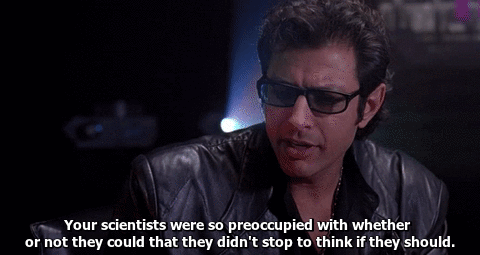It’s been a few weeks, so it feels like we can talk about this now. Regardless, let me obligatorillay begin by saying Minor Spoilers for Rogue One ahead.
With the passing of Carrie Fisher last week, one of the most immediate questions fans had was “What does this mean for Episode VIII?” Well, it turns out she had filmed everything she needed to for that film. “But what about Episode IX?!?!” Well, there’s the rub.
There’s obviously no replacing someone like Carrie Fisher, in so so so many ways. Or is there?
With the digital wizardry employed in Rogue One to bring Peter Cushing back to the screen as Grand Moff Tarkin as well as the 19 year old visage of Carrie Fisher from the final shot of the film, we find ourselves on an incredibly slippery ethical slope.
To take a note from another classic franchise:

First, let’s give Lucasfilm credit where credit is due: they seemed to have done this the right way, and we should lay out what they did as a model for future attempts to create digital re-creations of real actors:
1- They had the full cooperation and approval of the estate of Peter Cushing.
2- They were motivated by necessity and integrity to the story, not convenience.*
3- They were replacing people who were either unavailable or who had given their consent to being replaced.*
You note I had some asterisks, which means that there are specific issues around Carrie Fisher not being in Rogue One that we should discuss.
While by all accounts Fisher had approved a digital body-double and recreating her younger face, this is a far different issue than, say, de-aging Robert Downey, Jr. or Michael Douglas in their recent Marvel outings– they were in those films and simply had digital versions of themselves made to resemble their younger selves.
While Fisher made some offhanded remarks about being too old and out of shape to even play her younger self, we should probably take those as just Carrie being Carrie and being as tongue-in-cheek as ever. But maybe she was “kidding on the square”– saying that even though she had consented to it, she wasn’t really all right with it. That would be pretty par for the course for Fisher’s complicated relationship with Hollywood and how they have treated her, her family, and her career.
But it should alert us to the very clear ethical line we should draw with these technologies, or else fall victim to the very real (and very damaging) problems of photoshopping in the print industry with still photos, especially of female models. As soon as this becomes a tool to take a (female) actor and make their appearance more “youthful” or “sexy” (eg, appropriate for the male gaze), then we’re far to the other side of the line.
But living actors have unions, they have voices: I trust that they will be able to speak for themselves and the ability of each actor to control their own image will remain theirs and theirs alone.
As for dead actors, let’s draw a similar ethical line — and use Lucasfilm as an example of what to do right: this technology should be used sparingly and only with the consent of those closest to the deceased. And with someone who is recently departed, extra special care should be taken.
I will personally draw a quick line in the sand and say that while Star Wars without Carrie Fisher as Princess Leia is largely unfathomable, I would rather not have her digitally resurrected for Episode IX. I would rather they recast the role completely than create some digital Frankenstein’s monster.
As good as these effects are, there is still some small amount of Uncanny Valley that we haven’t quite escaped yet. And perhaps that’s comforting–as is the fact of how incredibly expensive and hard these effects are to produce. Or else we’d be tempted to do them all the time.
Let’s hope before it gets to be as simple to recreate someone digitally as it is to photoshop that we can come to an ethical consensus that no one should be recreated without their consent and/or compensation.
Until then, may The Force be with us, and guide us as we travel into deep ethical waters.